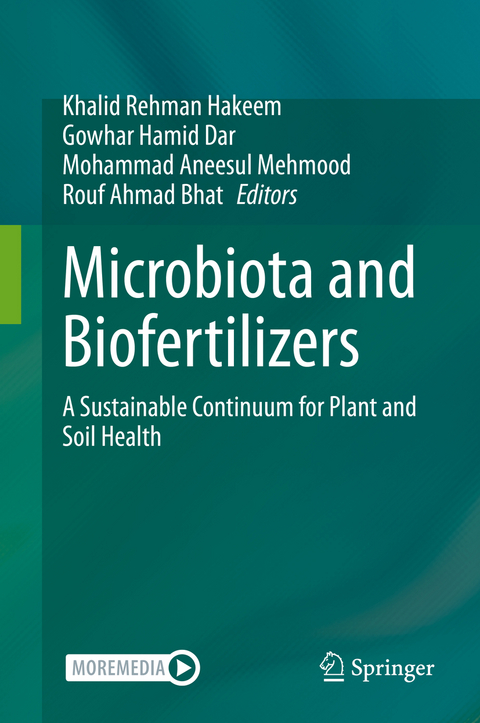
Microbiota and Biofertilizers
Springer International Publishing (Verlag)
978-3-030-48770-6 (ISBN)
Biofertilisers are compounds of organic matter that are applied to crops for growth and health. Their constituent micro-organisms interact in an ecofriendly manner with the soil, root and seeds of plants, promoting the growth of micro-flora that enhances soil fertility. They are known to play a number of vital roles in soil fertility, crop productivity and production in agriculture. Application of biofertilisers results in increased mineral and water uptake, root development, vegetative growth and nitrogen fixation. They liberate growth promoting substances and vitamins and help to maintain soil fertility. They act as antagonists and play a pivotal role in neutralising the soil borne plant pathogens, thereby assisting in the bio-control of diseases. Application of biofertilisers in lieu of synthetic fertilizers could be the promising technique to raise agricultural productivity without degrading the environmental quality.
The present book focuses on the latest research approaches and updates from the microbiota ecosystem and their applications in agriculture industry. It also highlightsthe great potential and possible future of action of microbiota in the development of sustainable agricultural systems.Dr. Khalid Rehman Hakeem is a Professor at King Abdulaziz University, Jeddah, Saudi Arabia. He has completed his Ph.D. (Botany) from Jamia Hamdard, New Delhi, India in 2011. Dr. Hakeem has worked as Post Doctorate Fellow in 2012 and Fellow Researcher (Associate Prof.) from 2013-2016 at Universiti Putra Malaysia, Selangor, Malaysia. His specialty is Plant Eco-Physiology, Molecular biology, Plant-Microbe-soil interactions, Medicinal plant research and Environmental Sciences and so far has edited and authored more than 25 books with Springer International, Academic Press, etc. He has also to his credit more than 110 research publications in peer reviewed international journals, including 40 book chapters in edited volumes with international publishers. Dr Hakeem is the recipient of many national and international awards and fellowships. Dr Gowhar Hamid Dar is an Assistant Professor at Pratap College Campus, Cluster University Srinagar, India. He has been working on the Isolation, Identification and Characterization of microbes for the last several years so to understand their behavioural aspects and to evaluate their industrial, economic aspects and their impact on our life. He has also published many research articles in reputed, referred international and national journals. Further he is involved in the teaching of post-graduate students of Environmental Science and in the teaching of Undergraduate course in Environment and Water Management at SP College campus of Cluster University Srinagar. Dr. Mohammad Aneesul Mehmood is an Assistant Professor in the discipline of Environmental Sciences, Sri Pratap College campus, Cluster University Srinagar, 190001. He has published more than 30 peer-reviewed articles in international journals. His current research focuses on the effect of spatio-temporal dynamics of heavy metal contamination on fishes in an urban Himalayan Lake with particular reference to the endemic fish Shizothorax niger. Dr Rouf Ahmad Bhat completed his PhD in Environmental Science (specialization: environmental microbiology) from the University of Kashmir, Srinagar under the able guidance of Prof. Azra N, Kamili and Prof. Bashir A. Ganai. Currently he is working as an Assistant Professor (Environmental Science) at the Department of Environmental Science, Sri Pratap College, Cluster University Srinagar.
Chemical Fertilizers, Formulation and their Influence on Soil Health.-Organic agriculture: principles, current status and significance.-Responses of Soil Properties to Organic Amendments.-Vermicomposting: Sustainable tool for agriculture environs.-Application and viability of macrophytes as green manure.-Role of microorganisms as biofertilizers.-Nano-agriculture: A novel approach in agriculture
| Erscheinungsdatum | 05.01.2021 |
|---|---|
| Zusatzinfo | XXI, 297 p. 53 illus., 34 illus. in color. |
| Verlagsort | Cham |
| Sprache | englisch |
| Maße | 155 x 235 mm |
| Gewicht | 647 g |
| Themenwelt | Naturwissenschaften ► Biologie ► Botanik |
| Naturwissenschaften ► Biologie ► Ökologie / Naturschutz | |
| Schlagworte | Biofertilizer • fertilizers • microbiome • Mycorrhiza • organic agriculture • Rhizobia • Soil health • sustainable agriculture • symbiosis |
| ISBN-10 | 3-030-48770-9 / 3030487709 |
| ISBN-13 | 978-3-030-48770-6 / 9783030487706 |
| Zustand | Neuware |
| Haben Sie eine Frage zum Produkt? |
aus dem Bereich


